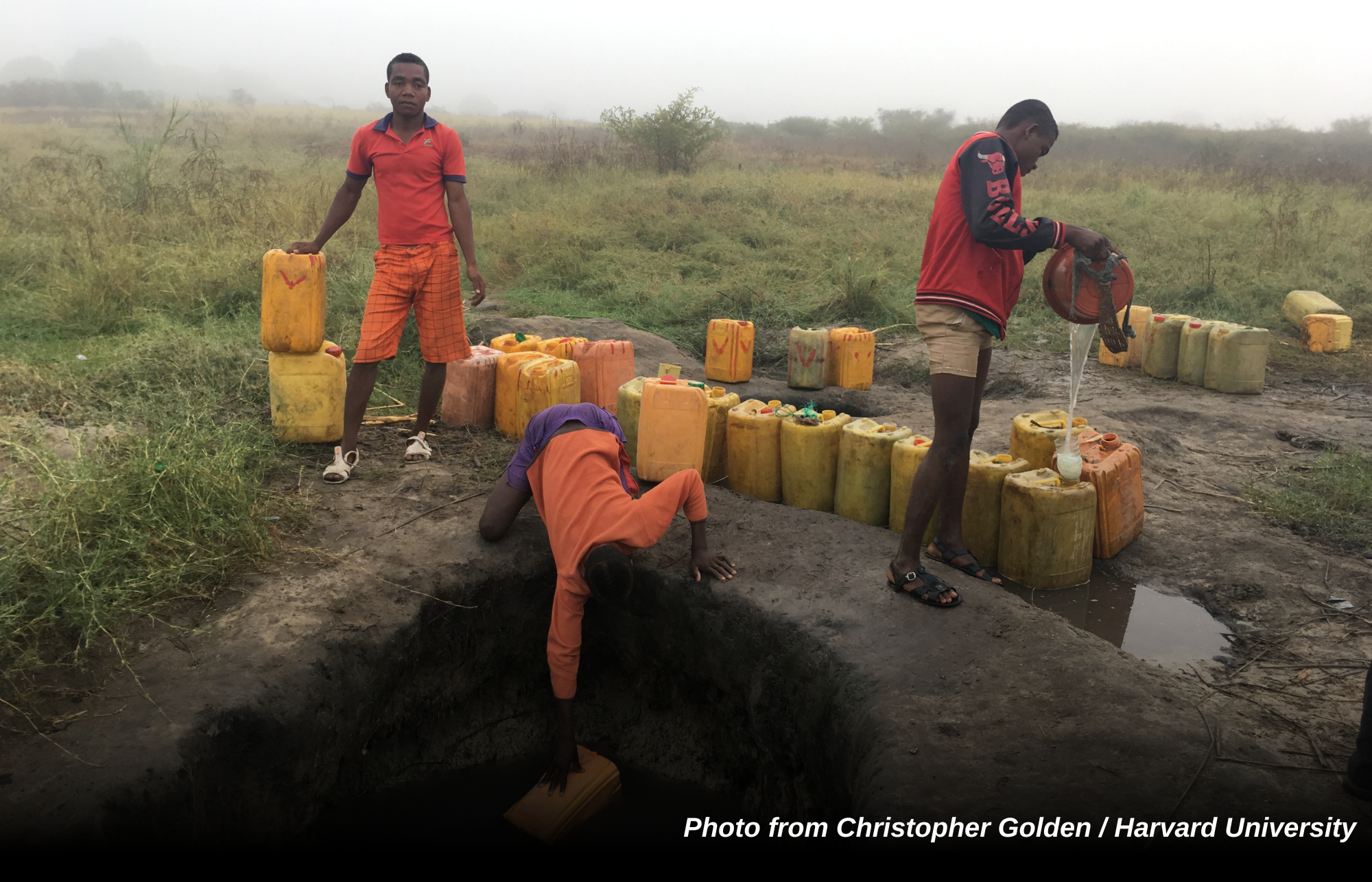UC Irvine scientist helps link climate change to Madagascar’s megadrought

Villagers in southwestern Madagascar collect fresh water from an aquifer near a small lake. Drought has caused regular sources of water to become less reliable in this region.
Irvine, Calif., April 9, 2024 — A University of California, Irvine-led team reveals a clear link between human-driven climate change and the years-long drought currently gripping southern Madagascar. Their study appears in the Nature journal Climate and Atmospheric Science.
“Using remotely sensed observations and climate models, we could see evidence that climate change is affecting the hydrological cycle in southern Madagascar, and it’s likely going to have big implications for the people that live there and how they grow their food,” said Angela Rigden, assistant professor of Earth system science at UC Irvine and study lead author. “Their rainy season is getting shorter, with a delayed onset of those seasons.”
What helped the Rigden team make the connection between the drought and climate change was a multi-year satellite record of vegetation greenness which shows shifts in southern Madagascar that indicate changes in water availability. “We’ve taken satellite-based remote sensing data of plants and related it to how much water is available in the soils,” she said.
The team then compared the shift in the rainy season window to what some climate models report would happen in the absence of human-driven climate change, and that is when they noticed the narrowing rainy season window. “That’s the fingerprint of climate change, the change in seasonality,” Rigden said.
Another key was the multi-year nature of the satellite record, which stretches back to the early 1980s. Such long observational records, especially for less developed and poverty-stricken places like southern Madagascar, are only available from satellites.
“We finally have a record long enough that we can see changes that are attributable to climate change,” Rigden said. “And there’s clear agreement between these observations and climate models that point to changes in seasonality.”
Christopher Golden, an associate professor of nutrition and planetary health at the Harvard University T.H. Chan School of Public Health and a study co-author, has been doing fieldwork in Madagascar for the past 25 years. He explained how southern Madagascar is an arid part of the world even without drought conditions, and that local people have borne witness to changes in rainfall patterns over the decades.
Colleagues at Catholic Relief Services and the USAID Mission to Madagascar, who are key stakeholders in the study, alerted Golden to the issues facing the country. For Rigden, the road to the study came after the United Nations announced that southern Madagascar was in a state of famine as a result of climate change in 2021. She wanted to see what satellite data might reveal about the situation.
“Our study shows that this phenomenon is entirely driven by climate change,” said Golden, who added that the study will help scientists provide more confident recommendations to policymakers who make decisions about where to send relief aid in the world. “The picture is that this is going to be recurrent into the future,” Golden said, which is information that can help officials justify the financing of relief efforts.
If populations know that events like droughts are not anomalies but part of a new normal, they can better prepare for the future. “We can come up with strategies to adapt,” Rigden said.
Funding came from Catholic Relief Services (Madagascar) through their partnership and funding arrangements with USAID.
UCI’s Brilliant Future campaign: Publicly launched on Oct. 4, 2019, the Brilliant Future campaign aims to raise awareness and support for the university. By engaging 75,000 alumni and garnering $2 billion in philanthropic investment, UCI seeks to reach new heights of excellence in student success, health and wellness, research and more. The School of Physical Sciences plays a vital role in the success of the campaign. Learn https://brilliantfuture.uci.edu/uci-school-of-physical-sciences.
About the University of California, Irvine: Founded in 1965, UC Irvine is a member of the prestigious Association of American Universities and is ranked among the nation’s top 10 public universities by U.S. News & World Report. The campus has produced five Nobel laureates and is known for its academic achievement, premier research, innovation and anteater mascot. Led by Chancellor Howard Gillman, UC Irvine has more than 36,000 students and offers 224 degree programs. It’s located in one of the world’s safest and most economically vibrant communities and is Orange County’s second-largest employer, contributing $7 billion annually to the local economy and $8 billion statewide. For more on UC Irvine, visit www.uci.edu.
Media access: Radio programs/stations may, for a fee, use an on-campus ISDN line to interview UC Irvine faculty and experts, subject to availability and university approval. For more UC Irvine news, visit news.uci.edu. Additional resources for journalists may be found at https://news.uci.edu/media-resources/.
